#ming long dou
Text

6 notes
·
View notes
Text

0 notes
Video
youtube
The Boondocks Season 3 Huey & Ming Kick Ball Story Moments
4 notes
·
View notes
Text
Do you like your men to have private armies but prefer access to antibiotics? Come right on in...
Watching the delicious trashiness of Maid’s Revenge has inspired me to make a listing of my favorite (and not so favorite) warlord and warlord adjacent cdramas. If like me, you like your male leads with polished boots and a side of murder, come right in. From most to least fave.
Siege in Fog
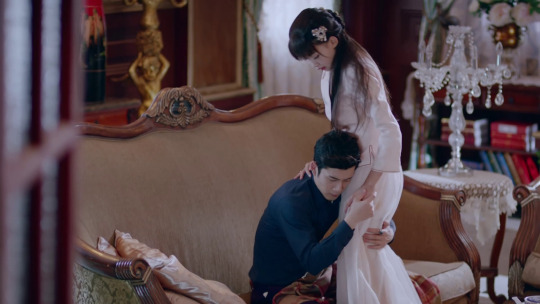
My most favorite on this list, this is visually gorgeous and emotionally visceral. Plus, it’s not just ONE warlord, it’s a whole family of them! It follows a deeply dysfunctional marriage between a beautiful woman and a warlord’s second son, where they fight and angst and love and fight some more, all the while bullets are flying and bodies are piling up. If you like incredible visuals, insane chemistry, dysfunction by the bucket and not one, not two, but THREE hot warlords, come right in. It’s based on a Fei Wo Si Cun novel so I assume you know you need a lot of tissues.
To sum up:
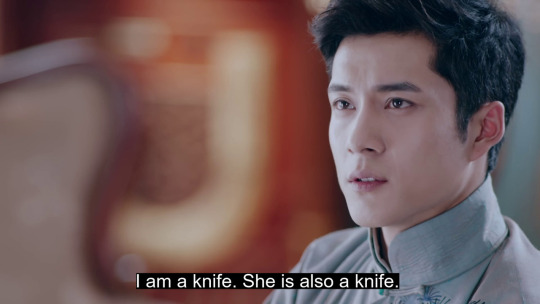
Too Late to Say I Love You

Another FWSC adaptation! This is an older drama, done long before cdrama’s recent unwelcome slide into wholesomeness, which means epic makeouts but also a warlord that revels in murder (at one point he takes out all his potential rivals, including his loved sister’s entire fam.) The OTP is dysfunctional - they hate, then they love, then they break up but he can’t let go - and the chemistry is beyond insane, with Wallace Chung and Li Xiao Ran melting my computer. Also, for once, a happy ending!
Winter Begonia

Probably the only genuine masterpiece on the list (tho I love FWSC dysfunction best for purely personal reasons), this is a MM story (though being cdrama it’s not explicit, though quite clear) and Huang Xiaoming as a trader with a private army and Yin Zheng as an opera singer with whom he forms a bond are both!!! I highly recommend it.
City of Streamer

Should be called “City of Steamer” because those make-outs and chemistry are epic! Timmy Xu is a son of a shady businessmen (with a small army of gun happy goons) who falls hopelessly in love with an older governess (Jing Tian) who is out for revenge on his family. She starts out using him and ends up using him in a different sense, if you know what I mean! The plot derails a bit by the end but it’s still a great watch.
PS...
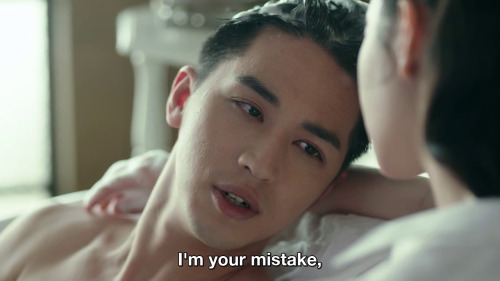

Maid’s Revenge
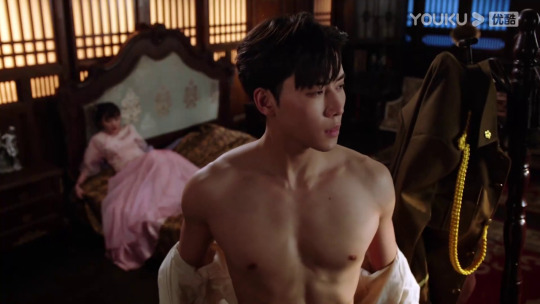
I am watching it right now. At only 10 minutes per ep, it skips plot and gives us the melo and chemistry we (and I mean I) crave and a guy whose muscles should be in a museum.
The Lady and the Liar
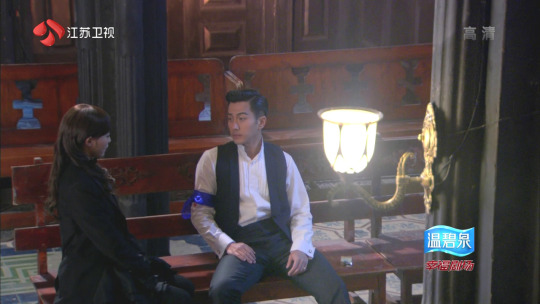
Hawick Lau is the ML and we all know this means “hot bastard.” He’s a crime lord with a goon squad falling for a lost heiress who loses her memory so he lies she’s his fiancee and deliciousness ensues. MMMMM
Arsenal Military Academy

Xu Kai is warlord jr but this is here mainly because of his awesome brother the businessman with murder squad. The drama is so-so (patriotism overtakes the amazing chemistry between Bai Lu and Xu Kai) but might be worth a peek.
Cruel Romance

(Can you say no to this face?)
Joey Chen has never worked in anything for me and this is no exception, but Huang Xiao Ming is dashing as hell as a sexy gangster.
Love In The Flames of War
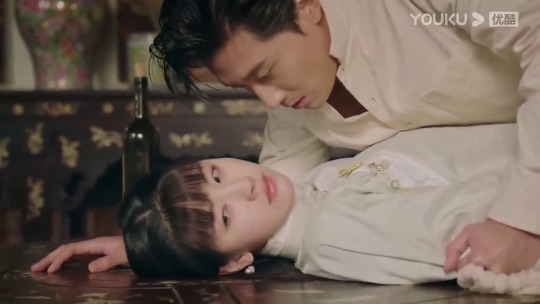
The heroine is terrible (I kept rooting for her to get accidentally shrapnelled) but Shawn Dou is sexy as hell as a warlord. (In the novel he was apparently a rapey headcase; they made him lovely in the drama without making his wife saner which is...a choice.) I’d say worth it on FF for hotness and whippings.
The Mystic Nine
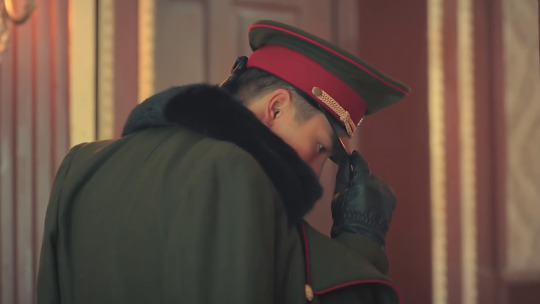
I tried. I tried to watch this drama three times. I could not. But William Chan as a warlord in a three-piece suit and cape is mega mega fine!
I suffer so you won’t have to:
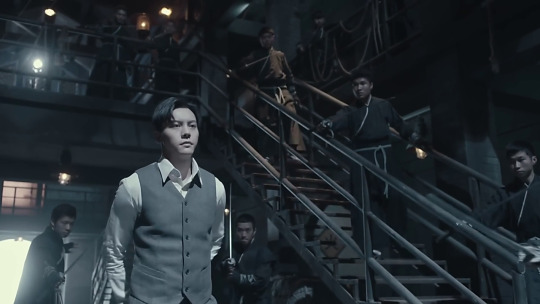

Fall In Love

The worst drama on this list, insulting to intelligence of anyone above pre-school level, 90% of the cast, including the leading lady, incapable of acting, a plot that makes a picture book seem complex and fashion disasters galore. However, Chen Xing Xu, playing the smirky warlord, carries this mess harder than Atlas and deserves to be in another, better drama altogether. Oh, what wouldn’t I give for him as a proper FWSC warlord!
Honorable Mention: Forward Forever - haven’t watched that one but keep meaning to.
#cdrama#fall in love#siege in fog#winter begonia#love in flames of war#forward forever#the mystic nine#cruel romance#the lady and the liar#city of streamer#maid's revenge#too late to say i love you#arsenal military academy
223 notes
·
View notes
Note
a o e i i er ai ei ao ou an en ang eng ong i ia iao ie iu ian in iang ing iong u ua uo uai ui uan un uang ueng ü üe üan ün a o e er ai ao ou an en ang eng yi ya yao ye you yan yin yang ying yong wu wa wo wai wei wan wen wang weng yu yue yuan yun b ba bo bai bei bao ban ben bang beng bi biao bie bian bin bing bu p pa po pai pei pao pou pan pen pang peng pi piao pie pian pin ping pu m ma mo me mai mei mao mou man men mang meng mi miao mie miu mian min ming mu f fa fo fei fou fan fen fang feng fu d da de dai dei dao dou dan den dang deng dong di diao die diu dian ding du duo dui duan dun t ta te tai tei tao tou tan tang teng tong ti tiao tie tian ting tu tuo tui tuan tun n na ne nai nei nao nou nan nen nang neng nong ni niao nie niu nian nin niang ning nu nuo nuan nü nüe l la le lai lei lao lou lan lang leng long li lia liao lie liu lian lin liang ling lu luo luan lun lü lüe g ga ge gai gei gao gou gan gen gang geng gong gu gua guo guai gui guan gun guang k ka ke kai kei kao kou kan ken kang keng kong ku kua kuo kuai kui kuan kun kuang h ha he hai hei hao hou han hen hang heng hong hu hua huo huai hui huan hun huang z za ze zi zai zei zao zou zan zen zang zeng zong zu zuo zui zuan zun c ca ce ci cai cao cou can cen cang ceng cong cu cuo cui cuan cun s sa se si sai sao sou san sen sang seng song su suo sui suan sun zh zha zhe zhi zhai zhei zhao zhou zhan zhen zhang zheng zhong zhu zhua zhuo zhuai zhui zhuan zhun zhuang ch cha che chi chai chao chou chan chen chang cheng chong chu chua chuo chuai chui chuan chun chuang sh sha she shi shai shei shao shou shan shen shang sheng shu shua shuo shuai shui shuan shun shuang r re ri rao rou ran ren rang reng rong ru rua ruo rui ruan run j ji jia jiao jie jiu jian jin jiang jing jiong ju jue juan jun q qi qia qiao qie qiu qian qin qiang qing qiong qu que quan qun x xi xia xiao xie xiu xian xin xiang xing xiong xu xue xuan xun
NAKU 🫵
40 notes
·
View notes
Text

For her 57th birthday (16 Aug), Carman Lee decided to try (not the first time really, but this is the first time she's attempted and recorded an original song) her hand at singing.
Though obviously she's not a professional singer, for an amateur, I'd say it's not bad? And the song is easy on the ears at least! Even if not very memorable…
What's more delightful to me is that she chose to sing a song in Cantonese! (Carman's Mother Tongue is Cantonese) Just happy to hear a Canto song! (^^)
《我会等》 (粵語版) 唱:李若彤
《I'll Wait》 (Cantonese ver.) Singer: Carman Lee
(spoken in Mandarin)
我很喜欢现在的自己
wǒ hén xǐ huān xiàn zài de zì jǐ
I really like myself as I am now.
*******************************************
(actual song in Cantonese)
我梦见 每晚天空中有星闪过
ngo⁵ mung⁶ gin³ mui⁵ maan⁵ tin¹ hung¹ zung¹ jau⁵ sing¹ sim² gwo³
I dream every night of stars shooting across the sky,
擦过冷冷细雨 银河里降落
caat³ gwo³ laang⁵ laang⁵ sai³ jyu⁵ ngan⁴ ho⁴ leoi⁵ gong³ lok⁶
passing through the frigid drizzle, falling from the Milky Way,
心中丝丝暖意 似羽毛微微发光
sam¹ zung¹ si¹ si¹ nyun⁵ ji³ ci⁵ jyu⁵ mou⁴ mei⁴ mei⁴ faat³ gwong¹
warmth in the heart, like feathers faintly glowing.
我试过 每次孤单风里去摸索
ngo⁵ si³ gwo³ mui⁵ ci³ gu¹ daan¹ fung¹ leoi⁵ heoi³ mo² sok³
I've tried each time when lonely, to search amidst the breeze;
哪个最美答案 可找到么
naa⁵ go³ zeoi³ mei⁵ daap³ ngon³ ho² zaau² dou³ mo¹
for a perfect answer, can that be found?
深宵的街灯 可会送来 黎明给我
sam¹ siu¹ dik¹ gaai¹ dang¹ ho² wui² sung³ loi⁴ lai⁴ ming⁴ kap¹ ngo⁵
Can the night street lamps gift daybreak to me?
*******************************************
(曾淋雨等天色变化 雨会停下吗
cang⁴ lam⁴ jyu⁵ dang² tin¹ sik¹ bin³ faa³ jyu⁵ wui² ting⁴ haa⁶ maa¹
Once, soaked in the rain, waiting for the sky palette to change, I wondered when the rain would stop?
等春风吹过这季节 会看到鲜花
dang² ceon¹ fung¹ ceoi¹ gwo³ ze⁵ gwai³ zit³ wui² hon³ dou³ sin¹ faa¹
When the spring breeze passes this season, will there be fresh flowers to see?
等星光温暖护送我 纵迷途不怕
dang² sing¹ gwong¹ wan¹ nyun⁵ wu⁶ sung³ ngo⁵ zung⁵ mai⁴ tou⁴ bat¹ paa³
With starlight to warmly guide me, no fear with getting lost.
漆黑中闪烁带我与它归家
cat¹ hak¹ zung¹ sim² soek³ daai³ ngo⁵ jyu⁵ taa¹ gwai¹ gaa¹
Twinkling in the darkness, bringing me home with it.
曾和你等花开刹那 眼角含泪花
cang⁴ wo⁴ nei⁵ dang² faa¹ hoi¹ saat³ naa⁵ ngaan⁵ gok³ ham⁴ leoi⁶ faa¹
Once, while waiting for the flowers to bloom with you, I found my eyes welling up.
等心间充满了勇气 痛也会结疤
dang² sam¹ gaan¹ cung¹ mun⁵ liu⁵ jung⁵ hei³ tung³ jaa⁵ wui² gik³ baa¹
When the heart is filled with courage, pain too will heal.
温馨光景会永远吗 再回头牵挂
wan¹ hing¹ gwong¹ ging² wui² wing⁵ jyun⁵ maa¹ zoi³ wui⁴ tau⁴ hin¹ gwaa³
Will this cozy scene be forever? I look back with longing again.
与你穿梭四季 暖暖时光转过木马)
jyu⁵ nei⁵ cyun¹ so¹ sei³ gwai³ nyun⁵ nyun⁵ si⁴ gwong¹ zyun² gwo³ muk⁶ maa⁵
Shuttling through the seasons with you, wonderful times passing by (like) through a carousel.
*******************************************
Repeat *
5 notes
·
View notes
Note
Ji ji fu ji ji
a o e i i er ai ei ao ou an en ang eng ong i ia iao ie iu ian in iang ing iong u ua uo uai ui uan un uang ueng ü üe üan ün a o e er ai ao ou an en ang eng yi ya yao ye you yan yin yang ying yong wu wa wo wai wei wan wen wang weng yu yue yuan yun b ba bo bai bei bao ban ben bang beng bi biao bie bian bin bing bu p pa po pai pei pao pou pan pen pang peng pi piao pie pian pin ping pu m ma mo me mai mei mao mou man men mang meng mi miao mie miu mian min ming mu f fa fo fei fou fan fen fang feng fu d da de dai dei dao dou dan den dang deng dong di diao die diu dian ding du duo dui duan dun t ta te tai tei tao tou tan tang teng tong ti tiao tie tian ting tu tuo tui tuan tun n na ne nai nei nao nou nan nen nang neng nong ni niao nie niu nian nin niang ning nu nuo nuan nü nüe l la le lai lei lao lou lan lang leng long li lia liao lie liu lian lin liang ling lu luo luan lun lü lüe g ga ge gai gei gao gou gan gen gang geng gong gu gua guo guai gui guan gun guang k ka ke kai kei kao kou kan ken kang keng kong ku kua kuo kuai kui kuan kun kuang h ha he hai hei hao hou han hen hang heng hong hu hua huo huai hui huan hun huang z za ze zi zai zei zao zou zan zen zang zeng zong zu zuo zui zuan zun c ca ce ci cai cao cou can cen cang ceng cong cu cuo cui cuan cun s sa se si sai sao sou san sen sang seng song su suo sui suan sun zh zha zhe zhi zhai zhei zhao zhou zhan zhen zhang zheng zhong zhu zhua zhuo zhuai zhui zhuan zhun zhuang ch cha che chi chai chao chou chan chen chang cheng chong chu chua chuo chuai chui chuan chun chuang sh sha she shi shai shei shao shou shan shen shang sheng shu shua shuo shuai shui shuan shun shuang r re ri rao rou ran ren rang reng rong ru rua ruo rui ruan run j ji jia jiao jie jiu jian jin jiang jing jiong ju jue juan jun q qi qia qiao qie qiu qian qin qiang qing qiong qu que quan qun x xi xia xiao xie xiu xian xin xiang xing xiong xu xue xuan xun
6 notes
·
View notes
Text
Huey and Ming Li face off in the last inning.
#the boondocks#huey#ming li long dou#wushung harmonious junior senior kickball team#face off#the red ball#freshistheworld
11 notes
·
View notes
Note
Zhu Jie is in Lord Critical World? Dude, I nearly had a meltdown when I realized Jeffrey Ji was in it (because it also led to me realizing he was in Detective L), lol. -WeSIN
He IS! I was going through My Drama List yesterday after having that epiphany, and it's kind of hilarious how much of the cast also has at least one DMBJ adaptation under their belts.
Maybe one day I'll do a visual guide with pictures but for now:
-Zhang Mingen plays Qi Ling and also plays Zhang Rishan (Mystic Nine, Sha Hai, Ultimate Note)
-Jeffery Ji plays Yang Zi and also plays Hei Xiazi (Sha Hai)
-Maggie Huang plays Shen Yin and also plays Ya Nv/ChuChu (Reboot)
-Dean Wang plays You Ming (Lord II/Spectre) and also plays Lu Jian Xun (Mystic Nine)
-Zhu Jie plays Feng Hun (Lord V) and also plays Wang Meng (Sha Hai, Ultimate Note)
-He Long Long plays Ni Hong (Neon) and also plays Huo Daofu (Sha Hai, Reboot)
-Yao Lu plays the King of Southern Yao and also Wu Sanxing (TLT2) and Lao Ma (Sha Hai)
-Zhang Fan plays Ge Lan Shi and also plays Jin Wantang (Sha Hai, Ultimate Note) and Xue Wu (Reboot)
-Dou Bo Lin plays Bo Yi and also plays Bai She (Sha Hai)
-Benjamin Zhang plays Long Yi and also plays Chen Jin Shui (Sha Hai)
-Li Lin Fei plays Li Ji and also plays Sheng Sheng Man (Yin Nanfeng's hearing servant) (Sha Hai)
-Hong Xuan plays Shi Li and also plays Yin Nanfeng (Sha Hai, Ultimate Note)
-Wei Xiao plays the Silver Priestess and also plays A-Tou (Reboot)
-Eva Gao plays Princess Xi Liu and also plays Dan-jie (one of the film crew) (Sha Hai)
IT'S A LOT. Like they've reached the point where it's easier to count people who WEREN'T in a DMBJ adaptation.
28 notes
·
View notes
Text
The lineage of the Tang imperial house and its problems
By the time of the Sui-Tang era, a person’s culture played a more important role than his race. The ethnic origin of the Yang (楊) clan of the Sui and the Li clan of the Tang did not have much to do with their policies. They might well have descended from prominent Han families, but it is certain that these clans, a few generations back from the dynastic founders, had lived in the Wuchuan garrison, north of Yinshan (陰山) mountain for quite a long period of time. This historical fact seems to have given rise to the suspicion that the Sui and Tang imperial houses were of barbarian origin.
The suspicion about the origin of the Li clan had existed from the very beginning of the dynasty, because they had once had the hu surname Daye (大野). The Buddhist monk Falin (法琳) declared before Taizong that the Tang imperial house originated from Xianbei Tuoba Dadu (達闍 i.e., Li in Chinese) which was a noble scion of Yinshan, i.e., a barbarian lineage. Although Taizong reprimanded Falin, during the war of unification an enemy, Dan Xiongxin (單雄信), called Taizong’s brother Yuanji (元吉) a hu child, and a Tang minister Sun Fuqie (孫伏伽) let slip that when Gaozu Li Yuan was a child his friends were all queue-haired because the royal family was deeply imbued with hu custom.
The in-laws of the royal family were completely of the hu line. Li Yuan’s mother was a daughter of Dugu Xin (獨孤信), the Grand Marshal of the Northern Zhou, and a sister of Empress Dugu of Emperor Wen of the Sui, making Li Yuan nephew-in-law to Yang Jian (楊堅) and maternal cousin of Emperor Yang (煬帝). Li Yuan married the daughter of Dou Yi (竇毅), who was of the Xianbei line and a prefectural commander of the Sui. The mother of Empress Dou was the elder sister of Emperor Wu of the Northern Zhou, Senior Princess Xiangyang (襄陽長公主).
The lifestyles of Taizong and his crown prince Chengqian (承乾) were not much different from those of the hu people. During the incident of Xuanwu Gate (玄武門), Taizong killed his younger brother Yuanji and made Princess Yang, Yuanji’s wife, his own; Zhu Xi’s remark on this behavior is well known. Chengqian followed hu custom as well. He stole and slaughtered cattle and horses, and acted like a Turk qaghan, eating with his guards, wearing Turkic clothes, and speaking Turkic.
During Zhenguan period when the Tang royal ancestral temple was being set up, the ministers were discussing who should be the progenitor, and Yu Zhining (于志寧) objected to the suggestion that it be Li Gao (李暠). If Li Gao was their true ancestor, why would the early Tang emperors not want the family of Li Bao of Longxi (隴西), who were descendants of Li Gao, included in the imperial clan lineage? And why did Gaozong further lower the family rank of Li Bao? Thus it has been argued that the ancestors of the Tang imperial house must have been a degraded household of the Lis of Zhaojun (趙郡), or had just borrowed the surname of Li of Zhaojun [Li of Zhaojun - one of the Four Great families of Shandong, very influential in the beginning of the Tang era]. Given the fact that Gaozong suppressed Li Bao and did not honor the lineage of Zhaojun Lis, it is most likely that the actual pedigree of the Tang imperial house was quite different from what it claimed to be and that it was ethnically non-Han Chinese.
The Tang was ruled by the Han people in name, but in reality was a multi-racial regime, so the Sui-Tang dynasty was still seen as a Xianbei state by the nomads of Eurasia or the people from the western regions, and Tang was called Taugas, Tamhaj, or Tabgaĉ which stood for Tuoba. The dynasties from the Dai (代) through Northern Wei and on to the Tang are separate according to the Chinese-style names for dynasties, but in fact form a continuous Tuoba state. Considering the continuity and commonality between these dynasties, placing them under the single heading of the Tuoba state seems appropriate. In this aspect, westerners from the fifth to the ninth century who called China Taugas, Tamhaj, or Tabgaĉ, were closer to the truth. Taizong’s acquisition of the title “Heavenly Qaghan” after the destruction of the Eastern Turks, Gaozong’s being addressed thus by nomadic rulers, and the fact that the majority of the early Sui-Tang imperial clan and high officials came from the military leaders of northern tribesmen, all provide further support to the Tuoba state argument.
Fabricating history and the rise of the zhonghua sovereign
The imperial houses of Sui and Tang saw themselves as traditional Han Chinese, although they were genetically descendants of nomadic tribesmen such as the Xianbei and others. But no matter how they identified themselves and their dynasties, few saw them and their dynasties as purely Han Chinese. It is clear now that the Li house of the Tang did not descend from a renowned clan, even if they had been Han Chinese.
Why then did the Tang imperial house want to fabricate a lineage to appear as if it had been one of the renowned Han aristocratic clans? Throughout Chinese history, a certain degree of sinicization has been necessary for anyone or anything alien to come to China and earn a place there. This was the case for Buddhism as well as Nestorian Christianity, but this did not mean they ceased to be Buddhism or Christianity. In addition to the issue of sinicization, the Wei-Jin-Northern and Southern Dynasties era was an age of pedigree.
Chen Yinke (陳寅恪) has raised questions about Taizong’s re-publication of the History of the Jin and his ordering the writing of The Record of Clans and Lineages in the Zhenguan Reign Period (Zhenguan shizu zhi 貞觀氏族志), suggesting that the motive behind the omission, among the Sixteen Kingdoms, of Former Liang (前涼) and Western Liang (西涼) from the History of the Jin was the same as that behind The Record of Clans and Lineages in the Zhenguan Reign Period: namely to exalt the Li clan of the Tang and prove that they had a long and glorious pedigree. Many dynastic histories were written during Taizong’s reign; these were generally dynastic histories from after the era of the Three Kingdoms or from the History of the Jin, now re-written to conform to Tang legitimacy. The Tang imperial house strove to dispel the doubt that they originated from the Xianbei Tuoba tribe, and influenced the planning and compilation of dynastic histories, sometimes even down to the wording of the contents.
First, let us look at the chronological records (zaiji 載記) of the History of the Jin. There are thirty chapters of chronological records in the book. The name originated from The Eastern Watch Records of the Han (Dongguan Hanji 東觀漢記), written by Ban Gu (班固) under order of Emperor Ming, and the number of thirty chapters seems to have been taken from the thirty chapters of biographies of feudal lords and eminent people (shijia 世家) in The Records of the Grand Historian. While the shijia is a record for each feudatory, the zaiji is a chronicle for the independent political entities in China which were not enfeoffed by the Chinese emperor. By including the Sixteen Kingdoms with the zaiji, Taizong set them in a different category and treated them as extraneous to the legitimate Jin dynasty, clearly taking the Han Chinese attitude of degrading alien regimes.
The source for Taizong’s History of the Jin was The Spring and Autumn Annals of the Sixteen Kingdoms by Cui Hong of the Northern Wei, and in this book one record was devoted to each state; notably, though, two states which were recorded in the Annals were omitted in the zaiji of the History of the Jin. They are Former Liang (301–76), which was established by a Han Chinese, Zhang Gui (張軌) of Anding (安定), and which occupied the Hexi corridor (河西回廊), and Western Liang (400–421) which was established by Li Gao of Longxi. The latter was the person later manipulated to become the ancestor of the Tang imperial house, and omitting him and his state was surely Taizong’s intention.
Another example is the compilation of the History of the Southern Dynasties (南史) and the History of the Northern Dynasties (北史), which concealed two underlying intentions. The first was to tie the Southern Dynasties (南朝) and Northern Dynasties (北朝) into one term, the Southern and Northern Dynasties (南北朝). If Taizong had truly been in favor of the Han Chinese point of view, he could have given legitimacy to the Southern Dynasties; but he could not ignore his own racial origins in the Northern Dynasties, and thus merging the two was the better option. Second, by including the Sui dynasty, the unifier of China, among the Northern Dynasties, he wanted to minimize the credit they received for having accomplished that unification.
Many histories were published in the early Tang. Taizong’s reign saw the compilation of the so-called History of the Five Dynasties, namely History of the Liang, History of the Chen, History of the Northern Qi, History of the Zhou, History of the Sui, and in 646 History of the Jin (these six historical works are known as the Six Histories). Then, during Gaozong’s reign, still under the shadow of Taizong, the History of the Southern Dynasties and the History of the Northern Dynasties were completed. Among the twenty-four histories that are considered official dynastic histories, eight—a third of the total—were published at this time. Taizong had opened up a new era in Chinese history publication by beginning the tradition of government-sponsored official history, and also by permitting the incumbent emperor to inspect the records about himself, something that had previously been forbidden, and giving instructions on how to write about the incident of Xuanwu Gate.
Taizong’s manipulation of history was along the same lines as Gao Huan (高歡) of the Northern Qi, who distorted history and transformed his family into the renowned Bohai Gao clan; but it was successful. Tang monarchs managed to transform themselves from racially and culturally hu rulers into zhonghua emperors to such an extent that people of later times accept without doubt that the Tang was a legitimate Chinese dynasty.
Taizong’s satisfaction with the effectiveness of official histories is manifest in the edict ordering the re-publication of History of the Jin: “How great is the usefulness of historical books!”
Source:
From Barbarians to the Middle Kingdom: The Rise of the Title “Emperor, Heavenly Qaghan” and Its Significance
by Han-je Park
http://cces.snu.ac.kr/data/publications/jces3_2park.pdf
29 notes
·
View notes
Video
youtube
倫桑/張曉涵【字正腔圓】Zih Jheng Ciang Yuan 看萬山紅遍 跟著我念字正腔圓【動態歌詞 Lyrics】
收聽更多音樂↓↓↓
Listen to more music↓↓↓
YouTube : 想念音樂頻道
【動態歌詞 Lyrics】
倫桑/張曉涵 - 字正腔圓
作詞:蘇珂
作曲:呂宏斌
編曲:塞米七
和聲:金天/雨蕁/倫桑
古箏:丁雪兒
看萬山紅遍 跟著我念字正腔圓
平上入去 譜意氣少年
秦漢唐宋元 朗朗書聲灑在窗前
誰家的詩篇傳頌了千年
Yo 你為什麼站在一旁吞吐
剛剛開場 不要著急道謝結束
說話要說清楚 像我說的一樣清楚
跟著我來反复
清晰 流暢還帶一點口才
舉手 投足謙卑努力成才
別讓發音奇怪 別人都太難猜
聽你說完還要問你what where why
仰天長嘯壯懷激烈
蕭瑟秋風換了人間
昨日三十功名塵與土
男兒須讀五車書
關關雎鳩在河之洲
雁字回時月滿西樓
這 剪不斷的理還亂的是離愁
別 是一般滋味在心頭
看萬山紅遍 跟著我念字正腔圓
平上入去 譜意氣少年
秦漢唐宋元 朗朗書聲灑在窗前
誰家的詩篇傳頌了千年
小海豚 小海疼 普通話要標準
花蝴蝶 發福蝶 聽得我快頭昏
大你魚越龍門
小腦斧會咬人
先生戒尺飛流直下讓我掌心發疼
大奶留 為什麼沒有guo
大機居 到底有幾隻jio
長江是長江 黃河不是黃ho
先生怎麼又在發火別再打我
仰天長嘯壯懷激烈
蕭瑟秋風換了人間
昨日三十功名塵與土
男兒須讀五車書
關關雎鳩在河之洲
雁字回時月滿西樓
這 剪不斷的理還亂的是離愁
別 是一般滋味在心頭
看萬山紅遍 跟著我念字正腔圓
平上入去 譜意氣少年
秦漢唐宋元 朗朗書聲灑在窗前
誰家的詩篇傳頌了千年
雁字回時月滿西樓
為情生者可以死 死可以生
不知所起一往而深
看萬山紅遍 跟著我念字正腔圓
平上入去 譜意氣少年
秦漢唐宋元 朗朗書聲灑在窗前
誰家的詩篇傳頌了千年
看萬山紅遍 跟著我念字正腔圓
平上入去 譜意氣少年
秦漢唐宋元 朗朗書聲灑在窗前
誰家的詩篇傳頌了千年
【Pinyin lyrics】
Lun Sang/Jhang Siao Han【Zih Jheng Ciang Yuan】
Kan Wan Shan Hong Bian Gen Zhe Wo Nian Zi Zheng Qiang Yuan
Ping Shang Ru Qu Pu Yi Qi Shao Nian
Qin Han Tang Song Yuan Lang Lang Shu Sheng Sa Zai Chuang Qian
Shei Jia De Shi Pian Chuan Song Liao Qian Nian
Yo Ni Wei Shen Me Zhan Zai Yi Pang Tun Tu
Gang Gang Kai Chang Bu Yao Zhao Ji Dao Xie Jie Shu
Shuo Hua Yao Shuo Qing Chu Xiang Wo Shuo De Yi Yang Qing Chu Gen Zhe Wo Lai Fan Fu
Qing Xi Liu Chang Hai Dai Yi Dian Kou Cai
Ju Shou Tou Zu Qian Bei Nu Li Cheng Cai
Bie Rang Fa Yin Qi Guai Bie Ren Dou Tai Nan Cai
Ting Ni Shuo Wan Hai Yao Wen Ni What Where Why
Yang Tian Chang Xiao Zhuang Huai Ji Lie
Xiao Se Qiu Feng Huan Le Ren Jian
Zuo Ri San Shi Gong Ming Chen Yu Tu
Nan Er Xu Du Wu Che Shu
Guan Guan Ju Jiu Zai He Zhi Zhou
Yan Zi Hui Shi Yue Man Xi Lou
Zhe Jian Bu Duan De Li Hai Luan De Shi Li Chou
Bie Shi Yi Ban Zi Wei Zai Xin Tou
Kan Wan Shan Hong Bian Gen Zhe Wo Nian Zi Zheng Qiang Yuan
Ping Shang Ru Qu Pu Yi Qi Shao Nian
Qin Han Tang Song Yuan Lang Lang Shu Sheng Sa Zai Chuang Qian
Shei Jia De Shi Pian Chuan Song Liao Qian Nian
Xiao Hai Tun Xiao Hai Teng Pu Tong Hua Yao Biao Zhun
Hua Hu Die Fa Fu Die Ting De Wo Kuai Tou Hun
Da Ni Yu Yue Long Men
Xiao Nao Fu Hui Yao Ren
Xian Sheng Jie Chi Fei Liu Zhi Xia Rang Wo Zhang Xin Fa Teng Da Nai Liu Wei Shen Me Mei You Guo
Da Ji Ju Dao Di You Ji Zhi Jio
Chang Jiang Shi Chang Jiang Huang He Bu Shi Huang Ho
Xian Sheng Zen Me You Zai Fa Huo Bie Zai Da Wo
Yang Tian Chang Xiao Zhuang Huai Ji Lie
Xiao Se Qiu Feng Huan Le Ren Jian
Zuo Ri San Shi Gong Ming Chen Yu Tu
Nan Er Xu Du Wu Che Shu
Guan Guan Ju Jiu Zai He Zhi Zhou
Yan Zi Hui Shi Yue Man Xi Lou
Zhe Jian Bu Duan De Li Hai Luan De Shi Li Chou
Bie Shi Yi Ban Zi Wei Zai Xin Tou
Kan Wan Shan Hong Bian Gen Zhe Wo Nian Zi Zheng Qiang Yuan
Ping Shang Ru Qu Pu Yi Qi Shao Nian
Qin Han Tang Song Yuan Lang Lang Shu Sheng Sa Zai Chuang Qian
Shei Jia De Shi Pian Chuan Song Liao Qian Nian
Yan Zi Hui Shi Yue Man Xi Lou
Wei Qing Sheng Zhe Ke Yi Si Si Ke Yi Sheng
Bu Zhi Suo Qi Yi Wang Er Shen
Kan Wan Shan Hong Bian Gen Zhe Wo Nian Zi Zheng Qiang Yuan
Ping Shang Ru Qu Pu Yi Qi Shao Nian
Qin Han Tang Song Yuan Lang Lang Shu Sheng Sa Zai Chuang Qian
Shei Jia De Shi Pian Chuan Song Liao Qian Nian
Kan Wan Shan Hong Bian Gen Zhe Wo Nian Zi Zheng Qiang Yuan
Ping Shang Ru Qu Pu Yi Qi Shao Nian
Qin Han Tang Song Yuan Lang Lang Shu Sheng Sa Zai Chuang Qian
Shei Jia De Shi Pian Chuan Song Liao Qian Nian
6 notes
·
View notes
Text



252 notes
·
View notes
Text

#the boondocks#spiderverse fanart#morty smith#ming long dou#ceasar#marvel cinematic universe#sony pictures
0 notes
Text
Emperor Ming and Emperor Zhang (57-88) by Rafe De Crespigny
Themes: Army; Luoyang
Overview:
This chapter begins with the death of Liu Xiu and the installation of his son, Liu Zhang as Emperor Ming. It has a description of both the funeral and ascension of Liu Zhang, with De Crespigny explaining that it had been so long since a true succession had happened that there was confusion about the correct ceremony. He then discusses how accurate the Treatise of Ceremonial contained within the Hou Han Shu would have actually been.
The accession was made mildly more complicated by the presence of Liu Xiu’s other sons in the capital and the way they entered the Palace informally. De Crespigny explains how Liu Zhang became heir and how the situation had developed the way it had. As a result of this behaviour tighter restrictions were placed on kings. There was a half-hearted attempt to encourage one brother to contest the succession however the brother in question, Liu Qiang, reported it to Liu Zhang instantly.
Having become Emperor, Liu Zhang set about finishing building projects started by his father, visiting important sites and taking part in significant ceremonies. His successes at home were matched by military success with the surrounding tribes all acknowledging China’s rule. De Crespigny describes this as the golden age of the Later Han.
He turns next to his relationships with his brothers. He starts with positive ones, especially Liu Cang who Liu Zhang gave important roles in government too. However, he then moves to the brothers who caused him issues. Most significant was Liu Ying who was involved in ritual and the occult which had rebellious undertones. He was executed and a significant purge took place afterwards. De Crespigny suggests Liu Zhang overreacted to these events and lays out his reasons why. He also briefly touches on events in the Western Regions as Liu Zhang died.
He was succeeded by Liu Da, who was 19 when he became Emperor. Although there was no need for a regent, power was initially shared with his mother and two important officials. They had all died by the time Liu Da was 23 leaving him in complete control. De Crespigny says the first thing his government needed to deal with was the Western Regions, where in the northern part they had to retreat however in the southern section Ban Chao enjoyed a lot of success. Due to lots of factors the biggest threat to China, the Northern Xiongnu were weakened. There were also issues with the Qiang. De Crespigny says that although these conflicts were almost always resolved in favour of the Later Han, the constant conflict made people unwilling to live in the border regions leading to southern migration. However, he briefly touches on southern troubles too.
Domestically Liu Da attempted to show benevolence to his people, doing building projects for the benefit of the general population and declaring regular amnesties. He also regularly travelled the country offering sacrifices and handing out alms. De Crespigny says that he did this because he genuinely wanted to live up to the Confucian ideal for a ruler. As a result, he took great interest in the schools of interpretation with interesting consequences that De Crespigny discusses.
Finally, in this chapter De Crespigny discusses the death of Liu Da. His successor was still a child and so the Empress Dowager became Regent. He spends some time discussing the precedent for this during the Former Han dynasty as well as the process for becoming one of the consorts. He notes that most leading women came from the same few important families. This is used to make clear the difference between the landed gentry and the aristocratic families who traced lineage back to Emperor Guangwu’s allies and were the dominant power in this era. Having established the context, he explains the complicated politics of the Harem finishing with Empress Dou victorious and having adopted the new Emperor, Liu Zhao.
Analysis:
This chapter gives a wonderful overview of the reigns of Emperors Ming and Zhang. It focuses on the political history, both domestic and international relations and De Crespigny sign posts that he agrees with the good reputations both these Emperors continue to enjoy. This is a worthwhile read for one interested in the early history of the Later Han.
7 notes
·
View notes
Text
Minor Houses: Corinth
Playable Minor Houses Located on Corinth
Please keep in mind that the mythos attached to each house describe a general ethnicity for the overall family, though those ethnicities do no actually exist in Athena. Marriages, birth children, and adoption make it easier to bring more ethnicities into the houses, but we are not tolerating the whitewashing of minor houses. If you need help finding a playby, there will be a list of face claim suggestions provided on the canon list.
House Ayizan | Sworn to House Ladon
Senate Representative is Minister of Agriculture
Name based on Haitian mythos
The Ayizan family has long-established roots on Corinth, tracing back to the colonization of the planet. They are a well respected family with a large swath of land on which the Khandava University sits. The Ayizan family pours their wealth into research projects involving a breadth of topics, including terraforming research and agricultural genetics, at the school.
Portrayal Suggestions: Tyson Beckford, Isha Blaaker, Ysaunny Brito, Yaris Cedano, Salomon Diaz, Dilone, Winston Duke, Jourdan Dunn, Jean Elie, Rome Flynn, Jharrel Jerome, Aube Jolicoeur, Sessilee Lopez, Melodie Monrose, Lineisy Montero, Rafael Pérez, Joan Smalls, Arlenis Sosa, Arlenis Sosa, Tessa Thompson, Jasmine Tookes, Michael Ward, Jeneil Williams, Letitia Wright
House Caishen | Sworn to House Lazarevic
Senate Representative is Minister of Treasury
Name based on Chinese mythos
The Caishen family acts as the primary liaison between the Lazarevici and the Sikandars in all matters of the mining industry. They own equity in most of the major terra victus companies run by civilians and consortium members alike. The power of the Caishen family is in flux due to the recent terra victus boom on Tartarus.
NOTE: The eldest daughter of House Caishen is married to Devraj Sikandar, together they have one son.
Portrayal Suggestions: Hu Bing, Jing Boran, Gemma Chan, Estelle Chen, Tony Chung, Jin Dachuan, Shawn Dou, Pan Haowen, Sui He, Sissi Hou, Philip Huang, Xiao Wen Ju, Du Juan, Mae Mei Lapres, Zhao Lei, Daniel Liu, Silvia Liu, Ni Ni, Adam Pu, Huang Shixin, Fei Fei Sun, Liu Wen, Ming Xi, Hao Yun Xiang, Xin Xie
CLAIMED: House Haya | Sworn to House Sikandar
Name based on Mesopotamian mythos
***opportunities to join the family are available when the board opens***
The Haya family was responsible for creating the Haya Model-X spaceship, infamously known as the most devastating attack spacecraft utilized during The Great War. It is no longer being manufactured, however the Haya family continues to expand their spacecraft production business by focusing on public transports, private shipping vessels, and luxury spaceships.
NOTE: The adopted son of House Haya is berothed to Durga Sikandar.
Portrayal Suggestions: Akın Akınözü, Engin Akyürek, Cyrus Amini, Shademaneh Atashinmehr, Esra Bilgiç, Nazanin Boniadi, Hamid Fadaei, Faranoush Hamidian, Farzan Majafi, Arash Marandi, Medalion Rahimi, Irina Sharipova, Ramina Torabi, Özge Törer, Ali Yagci
CLAIMED: House Maurnan | Sworn to House Sikandar
Name based on Gothic mythos
***opportunities to join the family are available when the board opens***
Included in the spate of newly titled houses after the Great War, the Maurnan family proved their worth and loyalty to the Sikandars by intercepting coded communication during the conflict. Though once a family of modest origins, the Maurnans have carefully maneuvered their way into elevated society with knowledge and information as their specialty of choice. Whether through politicking, espionage, or hacking, they conceal their more unscrupulous methods behind a surgically crafted public image of charity and philanthropy.
Portrayal Suggestions: Melissa Anderson, Devon Aoki, Nadja Auermann, Paul Boche, Selle Coskun, Wojtek Czerski, Gerhard Freidl, Patrycja Gardygajlo, Amalie Gassman, Michael Gstoettner, Patrick Kafka, Zlata Mangafic, Dominique Melchior, Kati Nescher, Andreja Pejić, Kinga Rajzak, Serge Rigvava, Julian Schneyder, Werner Schreyer, Tim Schuhmacher, Helena Severin, Cate Underwood, Karolina Waz
House Serapis | Sworn to House Sikandar
Name based on Egyptian mythos
The Serapis family repurposed their large space station during The Great War to be an apolitical field hospital, earning it the respect and admiration of most of the noble families both during and after the war. Today it continues to be a state-of-the-art teaching hospital and research facility studying the effects of different atmospheres on the body while attracting the top minds in the medical field, regardless of political affiliation.
NOTE: One of the Serapis sons is married to Vela Ladon.
Portrayal Suggestions: Sonia Ben Ammar, Nora Attal, Rania Benchegra, Imaan Hammam, Habiba El Kobrossy, Rami Malek, Malika El Malhousi, Mena Massoud, Yasmine Al Massri, Omar Metwally, Azza Slimene, Ramy Youssef
4 notes
·
View notes
Video
Learn Chinese in Chinese stories|Chinese legends|Nuwa mended the sky
Human always like to live by water. The Yellow River Basin in China also gave birth to the earliest Chinese culture, and China's floods seem to be quite frequent, the five thousand years of Chinese history also was a history of water control.
In the Chinese legend, the water God Gonggong fought with the fire God Zhurong, Gonggong damaged the Buzhou mountains which supported the sky and earth, the water came out of the sky river, flooding the world. This was the first great flood. Finally, the human creator Nu WA made a multicolored divine stones out of hot fire
and mended the sky.
人类总是逐水而居。在中国的黄河流域也诞生了最早的华夏文化,而中国的水灾似乎特别多,中国人五千年历史,也是一部治水的历史。
传说水神共工与火神打架,一怒之下撞坏了支撑天地的不周山,天河的水流出,人间洪灾泛滥,这就是人类第一次大洪灾。最后,人类的创造者女娲娘娘炼成五彩巨石,终于修补了天空的漏洞。
CONTENT
Pan gu kai tian hou
盘古开天后
After Pangu created the world
You yi zuo ju da de shan zhi cheng zhe tian he di
有一座巨大的山支撑着天和地
There was a huge mountain that supported the sky and the earth
Ta de ming zi jiao bu zhou shan
它的名字叫不周山
It was called ‘Buzhou’ mountains
Nv wa niang niang chuan zao de ren lei jiu sheng huo zai bu zhou shan xia de tu di shang
女娲娘娘创造的人类就生活在不周山下的土地上
The human beings created by Nu WA live on the land beneath the Buzhou mountain
Ta men xing fu de sheng huo zhe
他们幸福地生活着
They lived happily
Ke shi you yi tian
可是有一天
Yet one day
Tian shang de huo shen Zhurong he shui shen Gonggong da le qi lai
天上的火神祝融和水神共工打了起来
The God of fire Zhurong and God of water Gonggong fought in the sky
‘Bu zhou shan nai cheng tian shi zhu,ruo zao sun huai hou guo bu kan she xiang
不周山乃撑天石柱,若遭损坏后果不堪设想
Buzhou montains are the stones to support the sky ,consequence is unimaginable if it damaged’
‘Wo yao rang suo you ren dou zhi dao wo shui shen gong gong de li hai
我要让所有人都知道我水神共工的厉害
I will let everyone know how sharp I am
Bu zhou shan tan ta ,tian he de shui liu le xia lai
不周山坍塌,天河的水流了下来
Buzhou montains collapsed ,and the water in the Sky’ river came down
Wei le zheng jiu sheng ling wan wu
为了拯救生灵万物
To save the people and other creatures
Nv wa jue ding xiu bu tian dong
女娲决定修补天洞
Nuwa decided to mend the sky
Xiu bu tian dong zhi you yi ge ban fa
修补天洞只有一个办法
These is only one way to mend the sky
Bi xu shou ji tian di jian de bao shi
必须收集天地间的宝石
Must collect precious stones in the universe
Yong zhi re zhi huo lian cheng wu cai shen shi
用炙热之火炼成五彩神石
Make a multicolored divine stone out of hot fire
Zhi you wu cai shen shi cai neng bu tian
只有五彩神石才能补天
Only the multicolored divine stone can mend the sky
Tian dong zhong yu xiu bu hao le
天洞终于修补好了
Finally the sky was mended
Bu zhou shan que quan bu tan ta le
不周山却全部坍塌了
All the Buzhou mountains collapsed
Tian di shi qu zhi cheng
天地失去支撑
The sky and earth lose support
Suo you sheng ming dou wu fa zai zhe pian tu di sheng cun
所有生命都将无法在这片土地上生存
All creatures can’t live on the land
Ke shi nv wa yi jing mei you li liang qu zheng jiu ta men le
可是女娲已经没有力量去拯救他们了
But Nuwa had no power to save them
Wo de zhe si tiao tui ke yi zhi cheng tian he di
我的这四条腿可以支撑天和地
My four legs can support the sky and the earth
Ke shi na xie ren lei zong shi chao chao nao nao de
可是那些人类总是吵吵闹闹的
But those humans are always noisy
Zhen de zhi de qu jiu ta men ma
真的值得去救它们吗
Is it really worth saving them
Ta men yong yuan dou shi wo de hai zi
他们永远都是我的孩子
They will always be my children
Qiu qiu nin bang bang ta men
求求你帮帮他们
Please help them
Wo zhi dao le
我知道了
I see
Qi shi wo hai shi xi huan an jing yi dian
其实我还是喜欢安静一点
I still like to be quiet
Zhong yu shen ao ye ye yong ta si tiao tui de li liang
终于神鳌爷爷用他四条腿的力量
Finally the huge legendary turtle used it’ four legs
Chong xin cheng qi le tian he di
重新撑起了天和地
Support the sky and earth again
Zai nan jie shu le
灾难结束了
The disaster finally ended
Ren lei ye kai shi le man chang de yu shui xiang chu de guo cheng
人类开始了漫长的与水相处的过程
Humans has begun a long history to get along with the water
KEYPOINTS
Shuǐ
水 water
Huǒ
火 fire
Shén
神 god
Shuǐ shén水神water god ;huǒ shén火神fire god
Huáng hé
黄河 The yellow river
Huáng hé dài yǒu dà liàng huáng tǔ gāo yuán chōng jí xià lái de ní shā ,hé shuǐ chéng xiàn huáng sè ,yīn cǐ jiào huáng hé
黄河带有大量黄土高原冲积下来的泥沙,河水呈现黄色,因此叫黄河
The Yellow River has a large amount of alluvial sediment from the Loess Plateau, and the river water is yellow, so it is called the Yellow River.
Huáng hé liú jīng de zhōng bù píng yuán dì qū shì huá xià wén míng zhǔ yào fā yuán dì ,yīn cǐ huáng hé yòu bèi chēng wéi mǔ qīn hé
黄河流经的中部平原地区是华夏文明主要发源地,因此黄河又被称为母亲河
The Yellow River flows through the central plain area, which is the main birthplace of Chinese civilization,so the Yellow River is also known as the Mother River
Cháng jiāng
长江 the Yangtze River
Zhè shì zhōng guó zuì cháng de hé liú ,yīn cǐ jiào cháng jiāng
这是中国最长的河流,因此叫长江
Yangtze river is the longest river in China, so it is called the Chang jiang ( literally mean long river ).
Zài cháng jiāng shàng jiàn yǒu sān xiá shuǐ lì gōng chéng
在长江上建有三峡水利工程
Three Gorges Project was on the Yangtze River
Zhōng guó de dì xíng cóng xī wǎng dōng ,àn sān gè jiē tī cóng gāo dào dī
中国的地形从西往东,按三个阶梯从高到低
From west to east ,the topography of China is from high to low by three steps
Yóu yú zhōng guó de dì xíng tè zhēng ,dà duō shù hé liú cóng xī xiàng dōng liú xiàng hǎi yáng
由于中国的地形特征, 大多数河流从西向东流向海洋
Due to topographical features, most rivers flow east or east into the ocean
ér zhōng guó dà duō shù rén kǒu yě dōu jū zhù zài dōng bù bǐ jiào fù yù de píng yuán dì qū
而中国大多数人口也都居住在东部比较富裕的平原地区
Most of Chinese people also lives in the richer plains of the east
.....
We hope to help you understand Chinese and Chinese culture in stories. Also, please LIKE, SHARE and COMMENT on our videos if you like. Thanks!
If you want more help in learning Chinese and try a private free class, you can
STEP1: visit OFFICIAL WEB: www.chinesetong.com
STEP2: REGIST with your email address
STEP3: MAKE AN APPOINTMENT to try a a FREE CLASS.
KEYWORDS 【#Chinese Tong #Learn Chinese #apprendre le chinois #Aprender chino #تعلم اللغة الصينية #중국어를 배우다 #belajar bahasa Cina #учить китайский #Chinesisch lernen #matuto ng Tsino #discite Sinica #Aprenda chinês #учим кинески #học tiếng Trung Quốc #impara cinese #למד סינית #вивчити китайську #فرهنگ و آداب و رسوم چینی #Çin kültürü ve gelenekleri #เรียนภาษาจีน #Chinese culture and customs # الثقافة والعادات الصينية # فرهنگ و آداب و رسوم چینی #Chinesische Kultur und Bräuche #Китайская культура и обычаи #Culture et coutumes chinoises #Kulturang Tsino atkaugalian #တရုတ်ယဉ်ကျေးမှုနှင့်ဓလေ့ထုံးတမ်းများ#Cultura e costumes chineses #Кинеска култура и обичаји #Çin kültürü ve gelenekleri #Китайська культура та звичаї #Cultura y costumbres chinas # Văn hóa và phong tục Trung Quốc #Cultura e costumi cinesi #วัฒนธรรมและประเพณีจีน #Pin yin #Mandarin #Chinese history #Chinese learning 】
3 notes
·
View notes